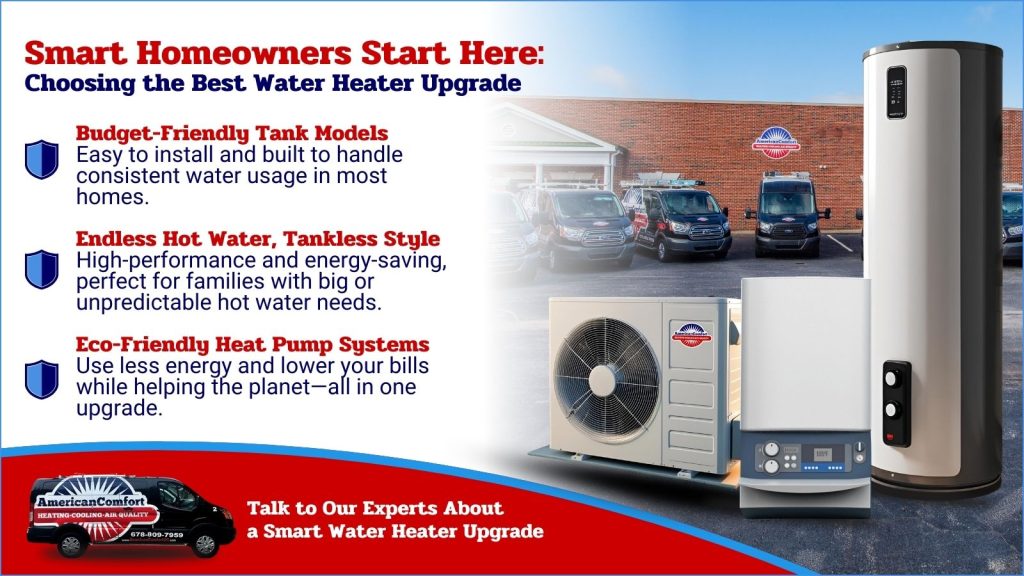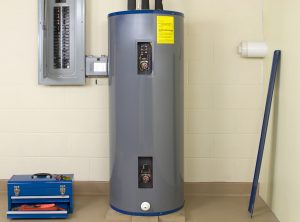If you’re ready to upgrade your water heater, understanding the different types—tank vs. tankless, gas vs. electric vs. heat pump—can help you make the best choice for your home. Upgrading your water heater is one of the smartest moves you can make as a homeowner.
A new water heater can increase your home’s energy efficiency, lower utility bills, and ensure you never run out of hot water when you need it most. But with so many options on the market, how do you know which type is right for your household? Let’s break down the most common types of water heaters and highlight their benefits so you can make a confident, informed decision.

Traditional Tank Water Heaters
Best for: Households with consistent hot water use and a tighter upfront budget
Tank water heaters are the most familiar option. They store a set amount of hot water—typically 40 to 80 gallons—that’s ready when you need it. When the hot water runs out, the tank refills and heats again. Benefits of tank water heaters include:
- Lower Initial Cost: Tank models are generally less expensive to purchase and install compared to tankless units.
- Reliable Supply: Provides a steady and reliable volume of hot water for daily use.
- Fewer Installation Hurdles: Most homes are already set up for tank models, making replacements simpler.
While tank water heaters may cost more to run over time due to standby heat loss (keeping water hot even when it’s not being used), newer models are more efficient than ever and may still suit many homeowners.
Tankless Water Heaters
Best for: Energy-conscious homeowners or households with fluctuating hot water needs
Tankless water heaters, also called on-demand systems, heat water only when you turn on the tap. Instead of storing water, they use high-powered burners or electric elements to deliver hot water instantly. Benefits of tankless water heaters include:
- Energy Efficiency: Since they don’t store water, there’s no energy wasted keeping water hot 24/7.
- Endless Hot Water: Great for larger families or homes with high hot water demand.
- Space Saving: These compact units are mounted on a wall, freeing up floor space.
- Longer Lifespan: Tankless units typically last 20+ years, compared to 10–15 for tank models.
Keep in mind that tankless systems usually require a larger upfront investment and may need upgrades to your home’s electrical or gas lines.
Heat Pump Water Heaters
Best for: Homeowners seeking maximum efficiency and long-term savings
Heat pump water heaters use electricity—but rather than generating heat directly, they move heat from the air into the water tank. They’re ideal for moderate to warm climates and work best in garages or utility spaces. Benefits of heat pump water heaters:
- High efficiency: they use up to 60% less energy than traditional electric models.
- Lower Energy Bills: You’ll see savings on your monthly utility bills thanks to reduced electricity use.
- Environmentally Friendly: Ideal for homeowners looking to reduce their carbon footprint.
Find the Right Fit for Your Home
Choosing the best water heater comes down to your household’s hot water habits, energy preferences, space availability, and long-term budget. Whether you want the reliability of a traditional tank, the efficiency of a heat pump, or the luxury of endless hot water from a tankless system, there’s a solution that’s just right for your home.
Frequently Asked Questions
Question: What are the main types of water heaters available for an upgrade?
Answer: The most common options include traditional tank water heaters, tankless water heaters, and heat pump (hybrid) models. Tank units are budget-friendly, tankless provide endless hot water, and heat pump systems offer excellent efficiency, especially in warm climates.
Question: What are the advantages of choosing a tankless water heater?
Answer: Tankless water heaters heat water on demand, which means no standby heat loss and a steady supply of hot water. They are compact and long-lasting, but they usually cost more upfront and may require electrical or gas line upgrades.
Question: How do heat pump water heaters compare in terms of efficiency?
Answer: Heat pump water heaters move heat from the surrounding air into the water, making them much more efficient than traditional electric units. They can cut energy use significantly, which lowers monthly utility costs, and are best suited for moderate to warm climates.
Question: When might a traditional tank water heater still be the best option?
Answer: A traditional tank water heater is often the best choice if you want a lower initial cost, need consistent hot water, or if your home is already set up for a tank system. Although less efficient, they remain reliable and practical for many households.
Question: How should I choose the right water heater for my household?
Answer: Choosing the right water heater depends on your budget, energy goals, and hot water usage. Tank models are affordable and simple, tankless units save space and provide endless hot water, while heat pump systems are ideal if efficiency and lower energy bills are your priorities.
Contact American Comfort Heating and Cooling for water heater service in Gainesville, GA. Bringing Comfort to America, One Home at a Time.



